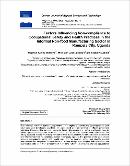Factors influencing non-compliance to occupational safety and health practices in the informal non-food manufacturing sector in Kampala city, Uganda

View/
Date
2020-02Author
Wekoye, Stephen Aurice
Moturi, Wilkister Nyaora
Makindi, Stanley
Metadata
Show full item recordAbstract
The informal non-food manufacturing sector is an engine of growth and development in both developed and developing countries. It’s unregulated and unregistered in official government statistics. However, this particular sector is faced with occupational safety and health hazards without preventive measures. A number of factors affect compliance with control measures. The study assessed factors influencing non-compliance to occupational safety and health practices in the informal non-food manufacturing sector in Kampala, Uganda. The purpose of the study was to acquire occupational safety and health data on the informal sector and identify needed interventions for mitigation. A cross-sectional survey design was adopted with qualitative and quantitative data collection techniques in 424 firms. Chi-square analysis showed occupational safety and health was good among male respondents compared to females (p<0.05. 2 =23.9), use of Personal Protective Equipment (2 =40.393, p<0.000), education level (2 =147.3, p< 0.000), period working at the enterprise (p<0.05. 2 = 87.5, p=0.002) the period spent working provides experience to workers hence better equipped to manage occupational safety and health. Hours spent at work (p<0.05. 2 =19.8), due to less fatigue and exhaustion. Multivariate logistic regression showed that respondents who were 31-40 years old had significantly reduced odds (COR 0.0467-0.0478) of practising occupational safety and health practices at work and able to employ good occupational safety and health practices at work, compared to below 30 and above 50 years. Men in general employed safe practices of occupational safety and health than women (COR 0.0918-0.0997) hence safer at work due to higher literacy in men. Adequate knowledge and awareness had (COR 0.860-0.863) knowledge empowers workers about hazards prevention, usually provided through training by employers. Duration of work (COR 1.189-1.10) as result of experience in managing hazards at work coupled by supervision over time. Use of personal protective equipment (COR of 0.0317- 0.0319) being cheap. Creation of awareness, safe work practices Provision and use of PPE and provision of occupational safety and health (OSH) regulations, as well as proactive multi-media strategies to improve the situation is required.
